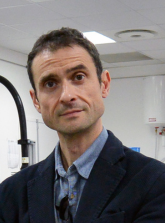
Year of Election
Division
Nationality
Country/Region of working/living
City
Institute
CV
Alain Celzard obtained his PhD in Materials Science and Engineering in 1995 on a confidential-defense topic related to composites for radar stealth. Recruited as the youngest lecturer in the Nancy-Metz academy (France) in 1996, he worked at the Laboratory of Inorganic Solid Chemistry on all kinds of porous and disordered materials, and taught for 9 years at the Nancy Faculty of Science: general inorganic chemistry, solid chemistry, transition metals, coordination chemistry.
After obtaining his accreditation to supervise research in 2002, he was appointed full professor at the age of 34, in 2005, to a position at ENSTIB (Epinal), specially created to set up new activities related to bio-based materials. His teaching changed completely: wood and natural fibers, composites, thermodynamics and chemical kinetics, physicochemical analysis methods. There, he founded and headed a laboratory branch in 2005, which became the "Biosourced Materials" team in 2012. At the end of 2017, he left the leadership of the team to take over one of the 4 scientific departments of the Institut Jean Lamour (UMR Université de Lorraine - CNRS 7198, one of Europe’s largest materials science laboratories and the largest of the CNRS Chemistry Institute), a highly interdisciplinary department with 7 research teams, to federate the unit’s activities on materials for the living.
From a research point of view, he develops a global approach to the study of materials for energy, environmental, biomedical and electromagnetic applications: synthesis, characterization, properties, modeling, integration. He also pursues fundamental research into complex, disordered and/or porous heterogeneous systems, not forgetting their optimization for a variety of applications. The materials concerned are mainly disordered and/or porous, organic or carbon-based but preferably biobased, ranging from composites and metamaterials to nanoporous adsorbents, through cellular or cross-linked monoliths, or even 3D printed materials, gels, powders and nanomaterials, as well as resins and membranes. These studies have led him to publish over 460 papers, 1 book and 11 patents, and have earned him two appointments to the Institut Universitaire de France as a Junior Member in 2010 and Senior Member in 2022, 3 national prizes including 2 first prizes, and 2 international prizes. He is also listed every year in the List of Top 2% Scientists of the World (Stanford University).
